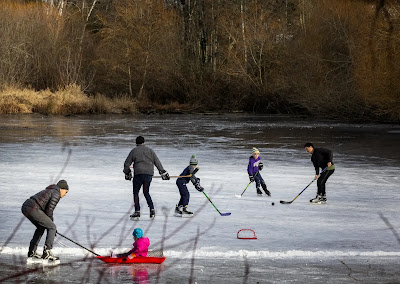We get plenty of crows in my neighborhood. I suppose they infest most Seattle neighborhoods. I posted an essay back in 2018, describing the existence of a gigantic crows' roost in Bothell, at the north end of Lake Washington. Every day, crows spread out from that roost to all parts of Seattle, seeking food and entertainment.
This morning, I was awakened from my daydreaming or reading or whatever I was doing by a clamor of crow-calls near the front of my house. I ignored it for a while. Crows flock together, and tend to get disturbed and/or excited by all sorts of things. A stray piece of bubble gum on the street. A small animal. Years ago, they held an extremely loud crow funeral in front of my house for a dead compatriot whose body I found lying on the ground.
Crows are intelligent, and at times seem almost human. For better or worse.
But today's uproar, though not quite as frenetic as that crow funeral, was very loud and showed no signs of easing off. I looked out the window, and saw masses of crows circling my front yard, with others coming from around the neighborhood to join in the excitement. They continued circling, but at first I couldn't see what their problem might be. No dead or dying fellow crow. No small morsel of food.
I have a medium sized tree in the middle of the yard that they seemed to be circling, occasionally swerving closely to its bare branches.
And then I saw it. Or should I say "him"? My black cat Castor had found a cozy spot to cuddle against the tree limbs, about half way to the top. He was curled up, and seemingly unconcerned by the uproar he was causing.
I opened the door and stepped out onto the porch. "Hey, hey, hey!" I exclaimed authoritatively. Castor ignored me, of course, but, worse, so did the crows. I guess I finally got on their nerves, however, because, gradually, by twos and threes, they began leaving the area, flying to other trees in the neighborhood.
Castor remained serene. He made no attempt to jump into my arms, exclaiming, "Oh, master, thank you for saving me. It was so horrible!" My cats aren't exactly like that.
I went inside. Fifteen minutes later, Castor ambled in through the cat door and suggested that a small snack might be in order. The crows weren't mentioned, and I knew better than to ask.
My cats like to chew on small birds, but I doubt they'd attack a bird as large and gregarious as a crow. Especially when they gather as a gang. I do understand, however, that cats and crows sometimes get friendly enough to play together. Or at least the crows play.
Why do crows and ravens like to harass other animals for no obvious benefit (biting at tails, especially in pairs)?--QuotaWhile it can be a form of territorial aggression, like many intelligent animals, crows and ravens play just for the fun of it.
Castor was not upset by this form of "play." But he was not amused.














.jpg)

